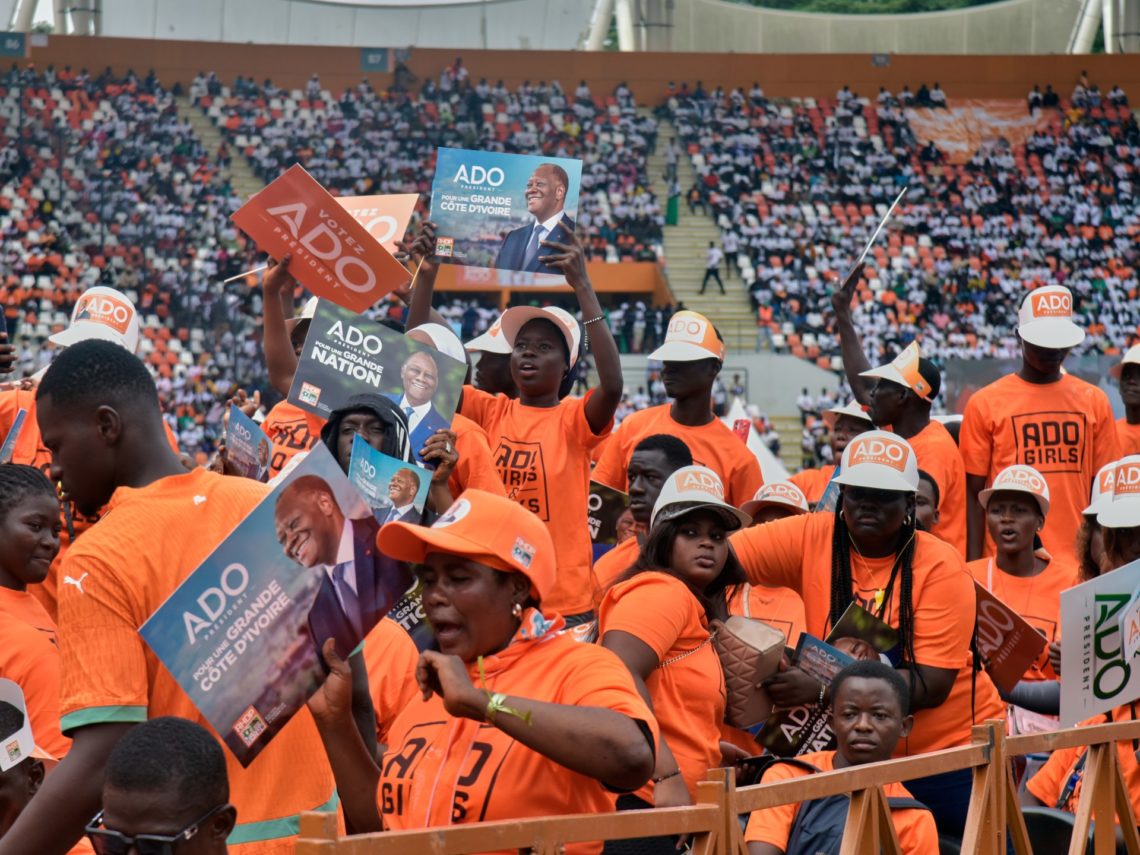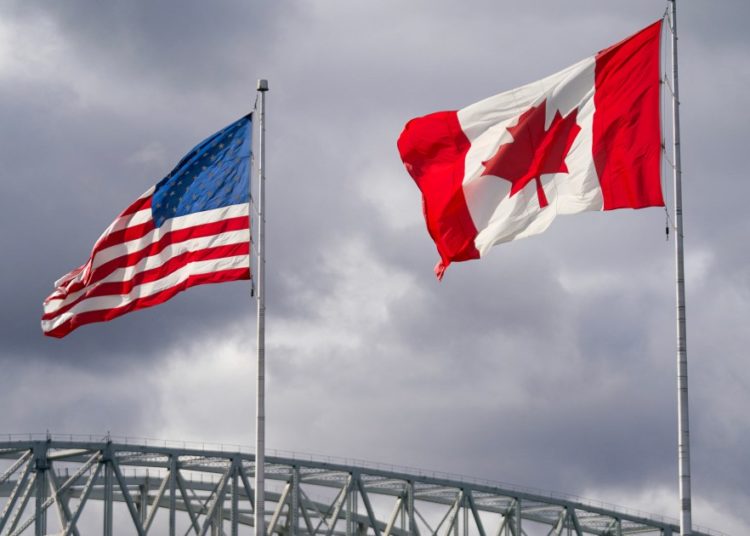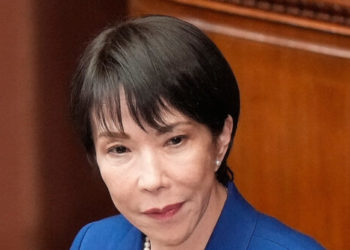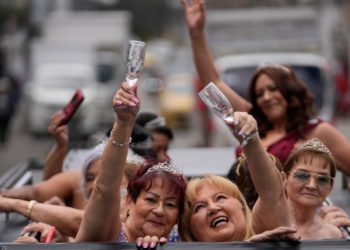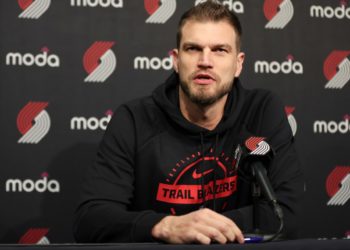Ivorians will head to the polls on Saturday, October 25, to vote in the presidential election amid widespread anger over incumbent President Alassane Ouattara’s decision to run for a fourth consecutive term. Under the constitution, presidents may only serve a maximum of two terms; however, Ouattara argues major constitutional change which was implemented in 2016 “reset” his limit.
Ivory Coast, the world’s largest cocoa and cashew nut producer, is a regional powerhouse and West Africa’s second-largest economy. Perched along the coast of the western Atlantic, between Ghana and Liberia, it boasts vast swaths of rainforest and pristine beaches. About one-quarter of the 32 million population is concentrated in the commercial hub of Abidjan, while the government has its headquarters in the inland capital city of Yamoussoukro. French is the official language in the former colony of France, while the main indigenous languages are Bete, Baoule, Dioula and Senufo.
The nation has seen steady economic advancement under Ouattara, according to metrics from the World Bank, but citizens complain of the rising cost of living and what they say is the unequal playing field for political contenders.
Ivory Coast has historically experienced deadly pre- and post-electoral violence. Election violence escalated into the second Ivorian civil war in 2011, when more than 3,000 people were killed after then-President Laurent Gbagbo refused to concede defeat to Ouattara. This time around, sporadic protests have already erupted in the weeks leading up to the election in response to a ban on key contenders from the polls, particularly Tidjane Thiam, the popular former head of Credit Suisse bank.
The government has cracked down on these protests, issuing a ban on demonstrations and arresting at least 237 people from the Common Front political movement, which campaigns against the exclusion of political candidates. By Tuesday this week, 58 people had been sentenced to 36 months in prison for protesting.
More than 44,000 police officers and military personnel have been deployed across the country to maintain calm at the polls, but analysts worry that election-day violence will be inevitable.
Some 8.7 million registered citizens aged above 18 will be eligible to vote this time, but the country has a low average voter turnout. In the 2020 elections, only 53 percent turned up at the polls.
The winning candidate must take an absolute majority of the votes; a second round will take place if no one clears a majority in the first.
Who has been barred from running for president?
Tidjane Thiam
The Constitutional Council shocked Ivorians in June when it upheld a lower court ruling that Tidjane Thiam, leader of the main opposition Democratic Party of the Ivory Coast (PDCI) and Ouattara’s biggest challenger, would be barred as a result of his erstwhile dual nationality.
The 63-year-old has widespread support from young people. He formerly worked in leading financial institutions, including Credit Suisse.
Thiam, a cousin of the first Ivorian president from 1960 to 1993, Felix Houphouet-Boigny, was born in the Ivory Coast but also received French nationality in 1987. Although he renounced it in March, the court ruled this was too late.
Laurent Gbagbo
Also barred is former president and arch Ouattara rival Laurent Gbagbo of the African People’s Party of the Ivory Coast (PPA-CI), who was charged with crimes against humanity in connection with the 2011 election-related civil war, when he refused to step down for the declared winner, Ouattara.
Gbagbo, 80, was indicted at the International Criminal Court (ICC) in The Hague, Netherlands, but returned to the Ivory Coast in 2021 following a lengthy trial and his ultimate acquittal. He was still barred from standing as president because of a criminal conviction in an Ivorian court, also related to the war.
Gbagbo’s close ally, Charles Ble Goude, who was also indicted and acquitted alongside him at the ICC, was excluded, as was Ouattara’s former prime minister, Guillaume Soro, who was convicted by an Ivorian court in 2021 on allegations of plotting a coup two years before.
Critics say the exclusion of key candidates, particularly Gbagbo and Thiam, has given Ouattara an unfair head start and essentially cleared the way for his fourth term.
“The exclusion of Gbagbo and Thiam has diminished political competition and will continue to drive political grievances that underpin civil unrest and political violence, including on the election day,” Beverly Ochieng, a Senegal-based political analyst at consulting firm Control Risks, told Al Jazeera.
Who is running?
Alassane Dramane ‘ADO’ Ouattara
The incumbent, Ouattara, 83, has been in office since December 2010.
He is the leader of the ruling Rally of Houphouetistes for Democracy and Peace (RHDP), and his government has been praised by observers for its efforts to restore unity following the bitter civil war, which was fuelled by ethnic tensions or ” Ivoirite ” – claims that particular ethnic groups were more “Ivorian” than others. The controversial term pitted groups in the predominantly Muslim north against the mainly Christian south. During his presidency, Gbagbo and his supporters had aimed to discredit Ouattara by calling him “non-Ivorian” because of rumours he has roots in neighbouring Burkina Faso.
Ouattara has a strong economic record, boosted by exports of cocoa and other agricultural products, as well as big infrastructure projects. Gross domestic product (GDP) rose by 8.2 percent on average each year in the first decade of Ouattara’s administration, according to the World Bank, and has continued to grow steadily since then, even during the COVID-19 crisis.
He was voted in as president for a second term in 2015 in a landslide victory. However, support for him has slipped since he decided to run again in 2020, as many Ivorians say it violated the two-term constitution limit. At the time, Ouattara initially said he would not run, but changed his mind after his party’s candidate died during the pandemic.
Backed by the Constitutional Council, Ouattara’s supporters argue that the adoption of a new constitution in 2016, which removed age limits for presidential candidates and revised nationality requirements, automatically reset the clock on his terms. In effect, they argued, Ouattara was eligible for two more terms, starting with the 2020 election.
Violent protests broke out following the president’s decision to run in 2020, and opposition parties boycotted the election, handing Ouattara another landslide. At least 85 people died in pre- and post-election riots.
There is widespread hostility across the Francophone West African countries towards their former coloniser, and the president’s decision to run for a fourth term has prompted protests in Abidjan, partly because of his perceived closeness to France.
In January 2025, the Ivorian government shut down French military bases, which had been operating in the country for decades, a move analysts say was designed to appease the public.
Still, Ouattara remains the clear favourite out of those who have been allowed to run, and he has promised to escalate infrastructure development and focus on education and health.
Analyst Ochieng noted that while the president retains support in the northern region, where he hails from, his party is also making inroads into the south, but is ultimately buoyed by state resources.
“With each electoral cycle, the playing field continues to be uneven due to strong institutional control and influence by the ruling camp over the political and security apparatus,” she said.
Simone Gbagbo
The head of the Movement of Capable Generations party, formed in 2022, Simone Gbagbo, 73, was widely known as the Ivory Coast’s “Iron Lady” during the turbulent administration of her then-husband, Laurent Gbagbo, who led the country during the first civil war between 2002 and 2007, and provoked a bloodbath in 2011 when he refused to concede to Ouattara.
Simone Gbagbo was widely viewed as a major orchestrator behind her husband’s decision. The couple were arrested together at their Abidjan residence in April 2011 in a raid by regional forces deployed to restore peace, leading to the end of the war.
Although both Laurent and Simone Gbagbo were indicted by the ICC for alleged war crimes related to the conflict, Ouattara’s government did not extradite the former first lady. Instead, she went on trial in the country and was sentenced to 20 years in prison in 2015 for crimes against the state. In 2018, Ouattara granted her amnesty. The couple divorced in 2023 following Laurent’s return from his trial at The Hague.
It is unclear why Simone has not been blocked from running for president despite her conviction. During her political rallies, she has stated that while Ouattara’s government has led infrastructure projects, she will address ongoing gaps in healthcare and job opportunities. She has also spoken out against the use of force against protesters and alleged raids on the homes of some opposition leaders.
Jean-Louis Billon
Having resigned recently as trade minister, the 60-year-old is the candidate for the Democratic Congress (CODE), a new coalition of 18 parties and political movements. Billon has referred to himself as a right-leaning politician.
The businessman and parliament member previously tried and failed to become a candidate for the opposition PDCI party after Thiam was barred from running. The PDCI has not presented another candidate, and many of its supporters say they have been left not knowing who to vote for.
Billon, who was a member of the cabinet until early this year, when he resigned to run for the elections, is promising “generational change” in leadership for Ivorians and has pledged to attract rapid private sector investment in the country. He is the son of Pierre Billon, founder of Ivory Coast’s agroindustrial company SIFCA Group, credited as the largest private employer in the country with about 17,000 workers.
Ahoua Don Mello
A former ally of Gbagbo, the ex-president, and his spokesperson during the 2011 crisis, Mello, 67, is running as an independent candidate after Gbagbo’s PPA-CI kicked him out over his decision to participate in the elections at all.
Mello, like other Gbagbo allies, has been subject to sanctions from the United States and the EU and was in self-exile from the Ivory Coast until 2021.
Henriette Lagou Adjoua
The 66-year-old leader of the centrist coalition, Group of Political Partners for Peace, is a campaigner for women in politics. She was briefly minister of social affairs between October and December 2000 under Gbagbo and was one of the first two women to ever run for the presidency during the 2015 elections.
What are the key issues in this election?
Political freedom and election violence
Opponents of Ouattara have strongly criticised the government’s ban on key political candidates, the blocking of protests and the arrests of demonstrators, and accuse the current president of backsliding on democratic values. There are concerns that there will be violent clashes between demonstrators calling for a vote boycott and security officials during the voting process.
However, Ochieng, the analyst, noted that while violence may occur in the opposition strongholds of Abidjan and Yamoussoukro, it is unlikely it will spread across the country, as seen in the 2011 crisis, because of the heavy presence of government forces.
“Despite political misgivings about Ouattara’s re-election bid, politicians do not want to appear as if they are encouraging acts of violence or vandalism that will likely lead to their prosecution,” Ochieng said, adding that there have so far been no signs of any sort of systematic mobilisation which could disrupt the polls.
Social inequality
Critics of Ouattara say his progress on the economy has been largely buoyed by International Monetary Fund-backed loans and, importantly, has not been equally experienced, with development centred on urban areas.
At present, the country owes more than $4bn to the IMF, and is one of the eight most indebted countries to the institution.
More than 39 percent of the population was living below the national poverty line in 2023, according to the World Bank.
The household consumption of the richest 20 percent of the population is about six times what the poorest 20 percent consume, according to the World Bank.
There is also sharp economic disparity between urban areas, where the poverty rate is an already very high 31 percent, and rural areas, where it is 54.6 percent. The quality and availability of crucial infrastructure such as water, schools and healthcare centres also differ sharply between the more deprived north and the wealthier south.
Climate change is adding to inequality, with heatwaves disrupting cocoa production as well as the harvest of tomatoes, chillies and other food crops in poorer, rural areas. The country has been forced to rely on neighbouring countries like Burkina Faso and Niger for food imports.
Armed groups in the region
Ivory Coast is also vulnerable to spill-over violence from its Sahel neighbours, Mali and Burkina Faso, where armed groups such as Jama’a Nusrat ul-Islam wa al-Muslimin (JNIM) and the ISIL affiliate in the Greater Sahara (ISGS) have been conducting a violent rampage, attacking communities and military bases.
In March 2016, three armed men attacked a hotel at the beach resort of Grand Bassam, killing 19 people. Two groups – al-Qaeda in the Islamic Maghreb (AQIM) and al-Mourabitoun – later claimed responsibility for the attack. It marked the first such attack on Ivorian soil.
Again, in June 2020, armed men raided a military outpost in northern Kafolo, on the border with Burkina Faso, killing 14 soldiers and injuring others.
This is a key issue in the campaign of Ouattara, who has pledged to ensure security. He has harped on the need for stability at a time of rising regional insecurity. His government, since 2022, has boosted the defence budget, increased troop deployments in the northern regions neighbouring the Sahel, and bought armoured tanks from countries like China.
The post Ivory Coast presidential election: Who’s standing and what’s at stake? appeared first on Al Jazeera.
